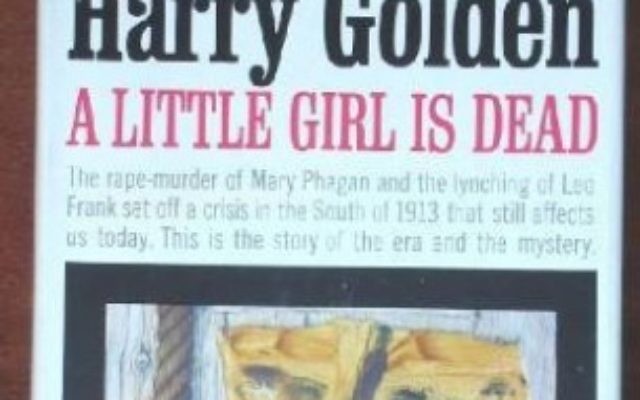Leo Frank on Stage, on Screen, in Print
The Leo Frank case has inspired multiple portrayals on the big and small screens and on the stage and has been written about in many books.
Among the dramatizations:
■ “The People v. Leo Frank,” a 2009 docudrama written and directed by Ben Loeterman from historical documents, stars Will Janowitz as Frank and Seth Gilliam as Jim Conley. The film, which includes archival footage, involved Linda Selig and Lynda Walker as producers and “And the Dead Shall Rise” author Steve Oney as its chief consultant and premiered at the Cobb Energy Performing Arts Centre before appearing on PBS.
■ “Parade,” a 1998 Broadway musical directed by Harold Prince with a book by Atlanta playwright Alfred Uhry and music by Jason Robert Brown. The show, which tracks the case from Confederate Memorial Day in 1913 through Frank’s lynching, won Tonys for best book and best original score.
■ “The Murder of Mary Phagan,” a two-night TV miniseries from 1988 produced by George Stevens Jr. and starring Peter Gallagher as Frank, Jack Lemmon as Slaton and Charles Dutton as Conley. Other familiar faces include Cynthia Nixon and Kevin Spacey.
■ A 1964 episode of the TV series “Profiles in Courage” about Slaton’s decision to commute Frank’s sentence. Walter Matthau plays Slaton, giving the former Georgia governor the distinction of being played by both members of the original “Odd Couple” film.
■ “They Won’t Forget,” a 1937 Warner Bros. film directed by Mervyn LeRoy based on a novel by former Atlanta newspaperman Ward Greene. Claude Rains stars as a small-town Southern lawyer railroading a teacher from Chicago for the murder of a young secretarial student played by Lana Turner.
■ “Murder in Harlem,” a 1935 movie made by black filmmaker Oscar Micheaux for black audiences in the segregated Depression-era film industry. As the title suggests, the details and setting of the case are changed, but the primary features remain the slaying of a young white girl, her white boss and a black night watchman at a factory as the key suspects, crucial testimony from a black janitor and the media frenzy. The movie is largely a remake of Micheaux’s “The Gunsaulus Mystery” from 1921.
Interesting reads among the many books:
■ “Screening a Lynching: The Leo Frank Case on Film and Television,” Emory University film professor Matthew Bernstein’s study of four screen dramatizations and how and why they differed.
■ “The Leo Frank Case,” the 2008 update of University of Arizona history professor Leonard Dinnerstein’s classic account of the case from 40 years earlier — before Alonzo Mann’s revelations about Conley and Georgia’s pardon of Frank in the 1980s.
■ “And the Dead Shall Rise: The Murder of Mary Phagan and the Lynching of Leo Frank,” former newspaper reporter Steve Oney’s definitive work on the case from 2003. The book reflects 17 years of work by Oney after Mann’s revelations about Conley sparked renewed interest in the case in the 1980s.
■ “The Murder of Little Mary Phagan,” which the victim’s great-niece Mary Phagan Kean wrote in 1987 and published in 1989 to present the family’s case for Frank’s guilt. The most interesting information is probably an account of a meeting in 1934 between Conley and Mary Phagan’s brother.
■ “The Silent and the Damned: The Murder of Mary Phagan and the Lynching of Leo Frank” by Maryland writers Robert Seitz Frey and Nancy Thompson, released in 1988, which is most noteworthy for possibly being the first book published about the case after Frank’s pardon, although it lacks the accuracy and authority of some other books.
■ “A Little Girl Is Dead,” Carolina Israelite publisher Harry Golden’s entertaining account of the case, including the question of why a white jury in Atlanta in 1913 would believe a black man’s testimony against a white man.
■ “Night Fell on Georgia,” Charles and Louise Samuels’ version of Phagan’s death and Frank’s trial from 1956. A cover blurb from Walter Winchell calls the book the “first authentic account” of the case.






comments